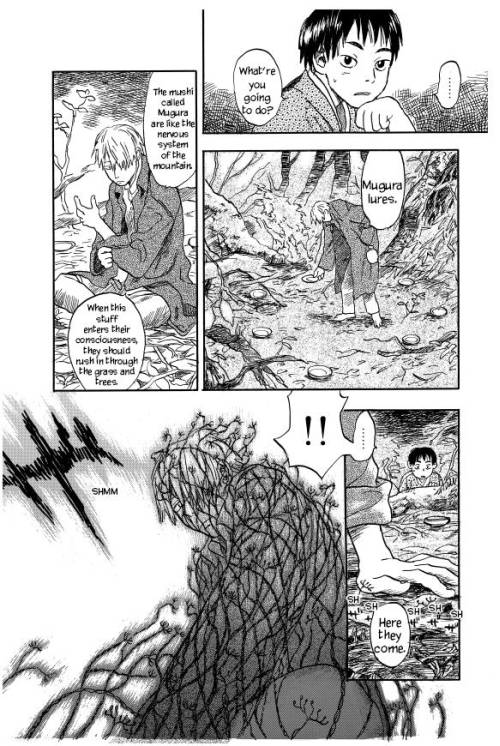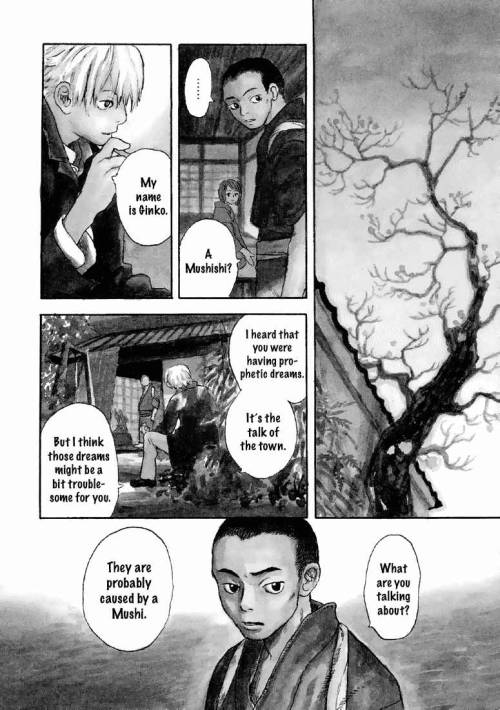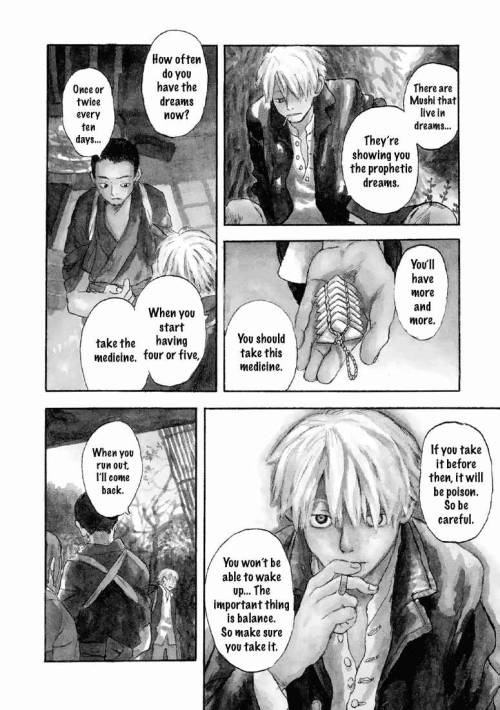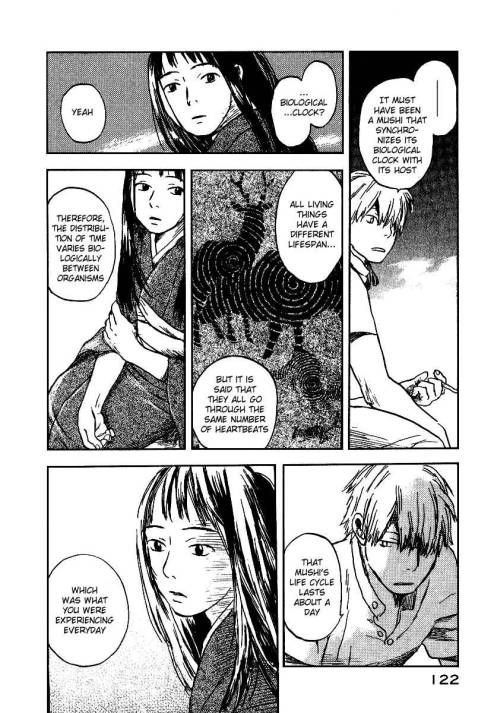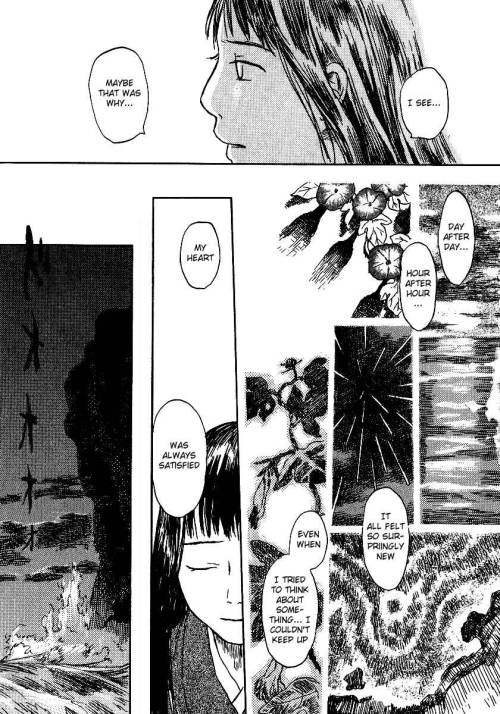Edit: Rest in Peace, Steve Jobs…
I’m heading off to New York Comic-Con this weekend, mostly for touristy reasons (since I’ve never been to NYCC before). As of now I haven’t packed much yet, so I’m panicking while trying to get things done at the last minute. At NYCC, I plan to just mostly hang around the BentoComics table, as well as try and cram some sight-seeing into the 10 days I’ll be in America.
After the last recommendation of Mononoke, it’s inevitable that I will continue my journey into the weird-Japanese-supernatural genre. So this week, I recommend the manga and anime series Mushishi.
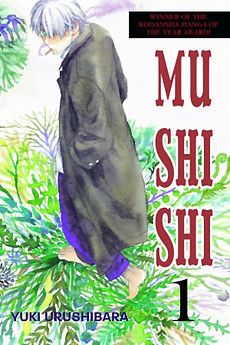 Mushishi (Yuki Urushibara)
Mushishi (Yuki Urushibara)
10 volumes, plus a 26-episode TV series
Mushishi is available in English from Del Rey, where I first heard of the series. I admit that I didn’t know what it was about when I first read it, and it took me two tries before I was able to get into it. Part of it is because it’s a series that has a pseudo-scientific fantasy universe, that is quite unlike anything I’ve encountered before. This series is strange and complex in a way that is difficult to describe.
Plot
In the world of Mushishi, there are creatures known as mushi that are ubiquitous, but just another life form like humans, animals and plants. These mushi can have supernatural powers, and when they become “off-balance” they can infect humans or geographical areas, and cause a lot of problems. Mushi are described as being closer to the essence of life, and more basic and pure than other living life forms. Most people are oblivious to their existence, while a select few can see and interact with them.
The story follows Gingko, who is one such person. He is known as a Mushi-shi – people who travel from place to place, dealing with problems that mushi can cause. Because mushi are just another life form who sometimes have symbiotic relationships with humans, they’re not evil, and aren’t trying to be. The series is episodic, with no over-arching plot, and follows Gingko from place to place as he encounters different kinds of mushi, and subscribes different methods of dealing with them.
Why I Recommend this Story
When people talk about unusual takes on the Japanese supernatural, they may mention the psychedelic anime series Mononoke (which I recommended 2 weeks ago). In the next breath, they would then say that Mononoke is like Mushishi. Ask them to explain that further, and they will be at a loss for words. Heck, I can’t explain how Mushishi is in any way like Mononoke. Both stories are unique and original in the way they imagine their universes, and perhaps the best way to describe them is that in the Forest of Genres, they’re relatives in a obscure, distant branch of the “Japanese Supernatural” Family Tree.
At least Mononoke is about an exorcist who exorcises monsters. I’m not sure what to call Gingko in Mushishi – he’s definitely not an exorcist, though some parts of his job may qualify as exorcism. There are no monsters in the traditional sense in Mushishi, though there are these creatures called mushi that are the cause of a lot of strange problems. Gingko goes from place to place, helping people who may be having problems with the mushi (sometimes they’re not), and then perhaps solving their problems (though sometimes he doesn’t). Since “mushi” is the Japanese word for “insects”, perhaps I can call him a cross between a pest-control agent and a biologist with a special streak of curiosity for the insect kingdom.
As a Mushi-shi, Gingko certainly seems more curious than most towards the mushi. While this is never addressed directly, other Mushi-shi seems to treat their jobs just as pest-exterminators, and that’s it. Gingko at least seems to take a scientific interest in the mushi, though considering the way he sometimes wanders into situations that didn’t ask him to become involved, he may just be a person who takes an interest in everything he encounters. I’m not sure. This series don’t make things clear-cut in the way some people expect their stories to be clear-cut. Situations are given, things happen, decisions both good and bad are made by the people in the story, and readers are left to ponder the results. Also, because humans need to co-exist with mushi irregardless, those looking for bombastic action scenes aren’t going to find any. There’s no good and evil in this story. There are just people, and mushi that act up for a variety of reasons.
No over-arching plot, and no special objectives to for Gingko to achieve either. And very few recurring characters except for Gingko and one or two of his friends. The art, while lush and beautiful in depicting nature, backgrounds and “the weird”, seems to be pretty forgettable when it comes to people. Urushibara doesn’t seem to be good at character designs – a lot of the characters have faces so similar it can be hard to tell who is who sometimes. So does this make the series boring? Some people complain that it’s boring after a while. Those expecting a pay-off, or a climatic boss-fight scene won’t get anything close to that. So why read this series?
One word: Originality. You won’t find anything else like Mushishi out there. This is a fully-formed universe, with its own eco-system, its own classifications of different mushi, and its own unusual methods of “curing” the “illnesses”. Heck, in one story, a character’s problem is solved just by moving to a coastal area – the mushi affecting her are dissolved by sea air, so all she has to do is to live by the sea. The stories often play out in the way a medical or scientific thriller would, except there’s no actual science involved. There is instead a humanistic approach to the characters and their issues in the stories, and it often deals with universal themes such as love, loss, the capacity people have to fool themselves, and the value of life. Perhaps a better comparison is not Mononoke, but Osamu Tezuka’s manga Black Jack; about a maverick surgeon who doesn’t so much heal patients, as helping patients heal themselves.
I’m not sure I did a good job in selling Mushishi, but then this story isn’t for the average person. Its strongest appeal is in its lack of predictability, and its sense of discovery – what mushi will we encounter next? What strange symptoms does it cause in people? What unusual methods will be used to get rid of them? To some people, it’s the most interesting thing in the world. To other people, they don’t see the point of it. If you want to have a crack at Mushishi, have a think about which camp you fall into. It will certainly affect your enjoyment of the series.
* I should mention that a lot of the stories in Mushishi are alternate re-tellings of Japanese myths and monsters. If you have prior knowledge of this, it will be more interesting and enjoyable than if you don’t.

